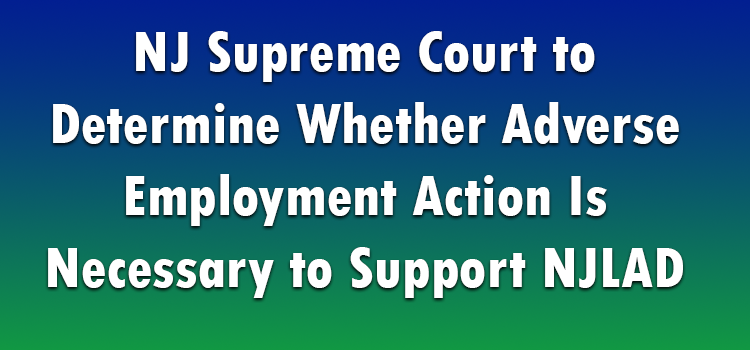The Supreme Court of New Jersey has agreed to consider Mary Richter v. Oakland Board of Education. The question before the court is whether the Appellate Division erred in finding that a diabetic teacher who suffered injuries after her blood sugar dropped on the job could pursue her disability discrimination claim against her employer without demonstrating that she suffered an adverse employment action.

Facts of Richter v. Oakland Board of Education
Plaintiff Mary Richter, a middle school teacher who suffers from diabetes, alleged she fainted while teaching due to low blood sugar levels when she was unable to eat lunch at an earlier class period and suffered significant and permanent injuries. She further contended that the accident would not have occurred had the Oakland Board of Education (the Board) and her school’s principal, Gregg Desiderio, granted her accommodation request to eat lunch earlier.
According to Richter, she believed that waiting until seventh period, which began at 1:05 p.m., to eat a meal would have a negative effect on her blood sugar levels due to the medications she takes for her diabetes. Therefore, she asked to have her schedule adjusted so that she could have lunch during the earlier fifth period. While Richter’s request was ultimately granted for a few months, her schedule returned to the 1:05 lunch time for one day a week (Tuesday). On Tuesday, March 5, 2013, towards the end of the sixth period, despite ingesting glucose tablets throughout the period, Richter suffered a hypoglycemic event in front of her students. She had a seizure and became unconscious causing her to strike her head and face on a lab table and the floor, and to bleed extensively.
As a result of her work-related injuries, Richter filed a lawsuit against the Board and Desiderio, individually and as principal of the school, alleging disability discrimination in violation of the New Jersey Law Against Discrimination (NJLAD) due to their alleged failure to accommodate her medical condition. The motion judge dismissed the suit, finding that Richter failed to prove a prima facie case of failure to accommodate her disability because she did not establish an adverse employment action.
Appellate Division Decision in Richter v. Oakland Board of Education
The Appellate Division reversed. It held that an employee alleging disability discrimination for failure to accommodate under the NJLAD is not required to establish an adverse employment action to avoid summary judgment dismissal.
In reaching its decision, the Appellate Division relied heavily on the Supreme Court of New Jersey’s decisions in Victor v. State, 203 N.J. 383 (2008) and Royster v. N.J. State Police, 227 N.J. 482 (2017). In those cases, the state’s highest court recognized that the NJLAD might cover a disability discrimination claim for failure to accommodate absent an adverse employment action.
“Our interpretation of Victor and Royster leads us to conclude that Richter’s LAD claim for failure to accommodate her diabetes disability should not have been dismissed on summary judgment based on a lack of adverse employment action,” the appeals court wrote. “Viewing the facts in the light most favorable to Richter, her claim falls within the unusual situation contemplated in Victor where ‘the employee could demonstrate that the failure to accommodate forced the employee to soldier on without a reasonable accommodation[]’ and there need not be proof of adverse employment action because the circumstances ‘cry out for a remedy.’”
The court further explained:
She requested an accommodation for an earlier lunch period to avoid a hypoglycemic event from not eating, which was provided for one marking period but not the following marking period. Under the impression that Desiderio did not change her schedule to allow for the earlier lunch period and she could not eat her lunch while supervising students during her cafeteria duty, Richter “soldiered on” by taking glucose tablets to maintain her blood sugar levels in order to teach. Sadly, her worst fears came to fruition when she fainted and seriously injured herself in front of her students. Hence, she should be allowed to present her claim for damages under the LAD at trial.
Issues Before the New Jersey Supreme Court
The Supreme Court of New Jersey granted certification on November 4, 2019. The court has agreed to consider the following question: “Is an employee alleging discrimination for failure to accommodate a disability, pursuant to the New Jersey Law Against Discrimination, N.J.S.A. 10:5-1 to -49, required to show an adverse employment action; and is this employee’s claim barred by the exclusive remedy provision of the Workers’ Compensation Act, N.J.S.A. 34:15-1 to -146?”
Oral arguments have not yet been scheduled.
